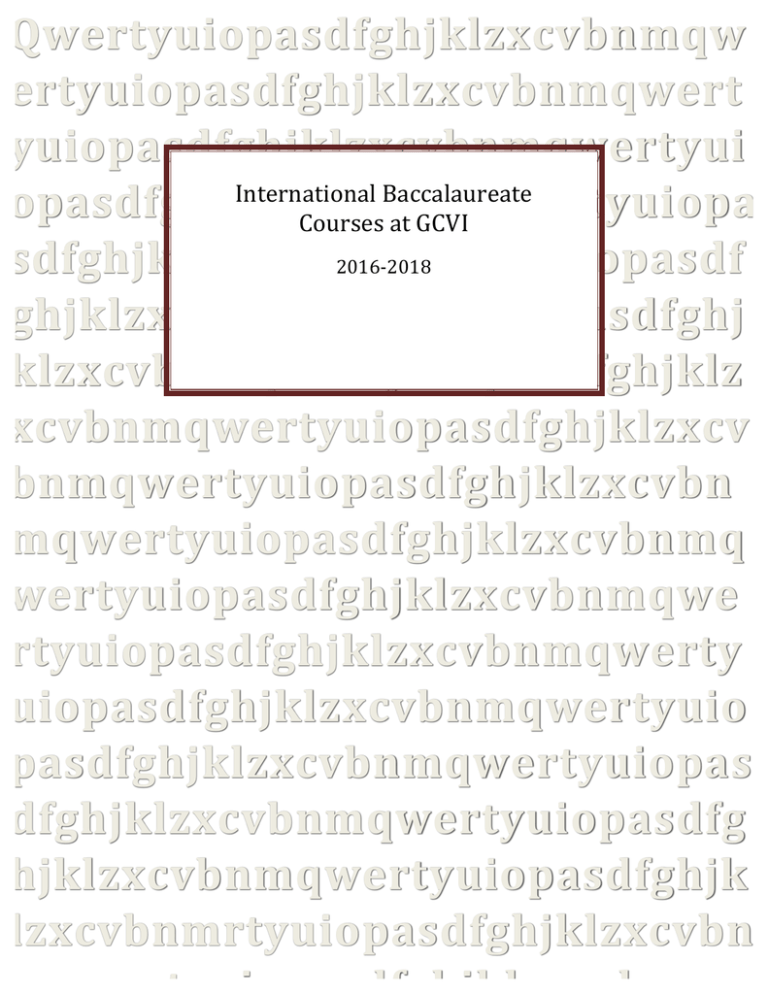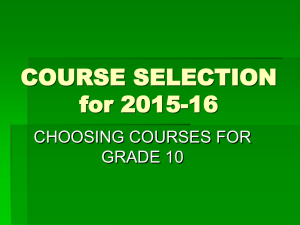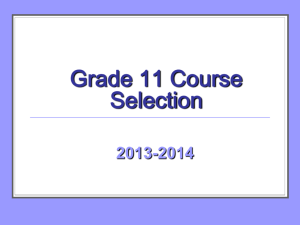Qwertyuiopasdfghjklzxcvbnmqw ertyuiopasdfghjklzxcvbnmqwert yuiopasdfghjklzxcvbnmqwertyui opasdfghjklzxcvbnmqwertyuiopa
advertisement

Qwertyuiopasdfghjklzxcvbnmqw ertyuiopasdfghjklzxcvbnmqwert yuiopasdfghjklzxcvbnmqwertyui International Baccalaureate opasdfghjklzxcvbnmqwertyuiopa Courses at GCVI sdfghjklzxcvbnmqwertyuiopasdf 2016-­‐2018 ghjklzxcvbnmqwertyuiopasdfghj klzxcvbnmqwertyuiopasdfghjklz xcvbnmqwertyuiopasdfghjklzxcv bnmqwertyuiopasdfghjklzxcvbn mqwertyuiopasdfghjklzxcvbnmq wertyuiopasdfghjklzxcvbnmqwe rtyuiopasdfghjklzxcvbnmqwerty uiopasdfghjklzxcvbnmqwertyuio pasdfghjklzxcvbnmqwertyuiopas dfghjklzxcvbnmqwertyuiopasdfg hjklzxcvbnmqwertyuiopasdfghjk lzxcvbnmrtyuiopasdfghjklzxcvbn Table of Contents GROUP 1 -­‐ LANGUAGE A ...................................................................................................................... 2 Language and Literature (HL) (OSSD Credits ENG3U, ENG4U, ETS4U)** ............................. 2 GROUP 2 -­‐ LANGUAGE B ...................................................................................................................... 2 Language acquisition French (SL) (OSSD Credits FSF3U, FSF4U)** ....................................... 2 Language ab initio German or Spanish (SL) (OSSD Credits LWG/S3U, LWG/S4U)** .......... 2 GROUP 3 -­‐ INDIVIDUALS AND SOCIETY ............................................................................................ 2 Economics (HL) (OSSD Credits CIE3M, CIA4U, BBB4M)** ....................................................... 2 History (HL) (OSSD Credits CHA3U, CPW4U, CHI4U)** ............................................................ 3 Psychology (HL) (OSSD Credits HSP3U, HHG4M, HSB4U)** .................................................... 3 Environmental Systems and Societies (SL) ................................................................................ 3 GROUP 4 -­‐ SCIENCES ............................................................................................................................. 3 Biology (SL or HL) (OSSD Credits SBI3U, SBI4U, plus additional credit PSE4U or SNC4M for HL)** ................................................................................................................................................. 4 Chemistry (SL or HL) (OSSD Credits SCH3U, SCH4U, plus additional credit SNC4M for HL)** ……………………………………………………………………………………………………………………………………………… 4 Physics (SL) (OSSD Credits SPH3U, SPH4U)** ........................................................................... 4 Environmental Systems and Societies (SL) (OSSD Credits SVN3M, CGR4M)** .................... 4 GROUP 5 -­‐ MATHEMATICS SCIENCES ................................................................................................ 4 Mathematics SL (SL) (OSSD Credits MHF4U, MCV4U)** ........................................................... 5 Mathematics Studies SL (SL) (OSSD Credits MCF3M, MDM4U)** ........................................... 5 GROUP 6 -­‐ THE ARTS ............................................................................................................................ 5 Music (HL) (OSSD Credits AMI3M/3V, AMI4M/4V, AMC4U)** ............................................... 5 Theatre (HL) (OSSD Credits ADA3M, ADC4M, ADA4M)** ........................................................ 6 Visual Arts (HL) (OSSD Credits AVI3M, AVI4M, AWT4M)** .................................................... 6 1 GROUP 1 -­‐ LANGUAGE A Language and Literature (HL) (OSSD Credits ENG3U, ENG4U, ETS4U)** The language A: language and literature course introduces the critical study and interpretation of written and spoken texts from a wide range of literary and non-literary genres. The formal analysis of texts is supplemented by awareness that meaning is not fixed but can change in respect to contexts of production and consumption. The course is organized into four parts, each focused on the study of either literary or non-literary texts. Together, the four parts of the course allow the student to explore the language A in question through its cultural development and use, its media forms and functions, and its literature. Students develop skills of literary and textual analysis, and also the ability to present their ideas effectively. A key aim is the development of critical literacy. Examples of topics of study include GROUP 2 -­‐ LANGUAGE B The main emphasis of the modern language courses is on the acquisition and use of language in a range of contexts and for different purposes while, at the same time, promoting an understanding of another culture through the study of its language. Language acquisition French (SL) (OSSD Credits FSF3U, FSF4U)** Language B Standard Level (SL) are language acquisition courses for students with some previous experience of learning the language. At GCVI students need to have studied Grade 9 and 10 Preparatory French to pursue French SL. The main focus of the course is on language acquisition and development of language skills. These language skills will be developed through the study of a range of written and spoken material. While studying the language, students also explore the culture(s) connected with it. The range of purposes and situations for using language in the language B courses extends well beyond those for language ab initio. Topics of study include social relationships, global issues, communication and media. Language ab initio German or Spanish (SL) (OSSD Credits LWG/S3U, LWG/S4U)** The language ab initio course is a language acquisition course for students with little or no experience of the language. The course is organized into three themes: individual and society, leisure and work, and urban and rural environment. Each theme comprises a list of topics that provide students with opportunities to practice and explore the language and to develop intercultural understanding. Through the development of receptive, productive and interactive skills, students develop the ability to respond and interact appropriately in a defined range of everyday situations. Topics of study include food and drink, daily routines, holidays, physical geography and the weather. GROUP 3 -­‐ INDIVIDUALS AND SOCIETY Studying any one of these subjects provides for the development of a critical appreciation of: • human experience and behaviour • the varieties of physical, economic and social environments that people inhabit • the history of social and cultural institutions. In addition, each subject is designed to foster in students the capacity to identify, to analyse critically and to evaluate theories, concepts and arguments relating to the nature and activities of individuals and societies. Economics (HL) (OSSD Credits CIE3M, CIA4U, BBB4M)** The study of economics is essentially about dealing with scarcity, resource allocation and the methods and processes by which choices are made in the satisfaction of human wants. As a dynamic social science, economics uses scientific methodologies that include quantitative and qualitative elements. The course emphasizes the economic theories of microeconomics and the economic theories of macroeconomics. These economic theories are not to be studied in a vacuum—rather, they are to be applied to real-world issues. 2 The ethical dimensions involved in the application of economic theories and policies permeate throughout the economics course as students are required to consider and reflect on human end-goals and values. The economics course encourages students to develop international perspectives, fosters a concern for global issues, and raises students’ awareness of their own responsibilities at a local, national and international level. The course also seeks to develop values and attitudes that will enable students to achieve a degree of personal commitment in trying to resolve these issues, appreciating our shared responsibility as citizens of an increasingly interdependent world. Topics of study include demand, supply and market equilibrium, government intervention, market failure, theory of the firm, international trade, the poverty cycle, international debt and exchange rates. History (HL) (OSSD Credits CHA3U, CPW4U, CHI4U)** History is more than the study of the past. It is the process of recording, reconstructing and interpreting the past through the investigation of a variety of sources. It is a discipline that gives people an understanding of themselves and others in relation to the world, both past and present. The Diploma Programme history course aims to promote an understanding of history as a discipline, including the nature and diversity of its sources, methods and interpretations. It also helps students to gain a better understanding of the present through critical reflection upon the past. At GCVI, students will study the route two option which focuses on 20th century world history. The course provides both structure and flexibility, fostering an understanding of major historical events in a global context. It requires students to make comparisons between similar and dissimilar solutions to common human situations, whether they be political, economic or social. It invites comparisons between, but not judgments of, different cultures, political systems and national traditions. Topics of study include causes and effects of 20th century wars, European states in the interwar years and the rise of fascism, Japanese, German and Italian expansion and the evolution and development of democracy. Psychology (HL) (OSSD Credits HSP3U, HHG4M, HSB4U)** The IB Diploma Programme psychology course is the systematic study of behaviour and mental processes. Students undertaking the course can expect to develop an understanding of how psychological knowledge is generated, developed and applied. This will allow them to have a greater understanding of themselves and appreciate the diversity of human behaviour. The holistic approach reflected in the curriculum, which sees biological, cognitive and sociocultural analysis being taught in an integrated way ensures that students are able to develop an understanding of what all humans share, as well as the immense diversity of influences on human behaviour and mental processes. The ethical concerns raised by the methodology and application of psychological research are also key considerations of the IB psychology course. Topics of study include biological level of analysis, cognitive level of analysis, developmental psychology, abnormal psychology, experimental design and qualitative research methodology. Environmental Systems and Societies (SL) See description below in Group 4 Sciences. GROUP 4 -­‐ SCIENCES Through studying a science subject students should become aware of how scientists work and communicate with each other. While the scientific method may take on a wide variety of forms, the emphasis is on a practical approach. In addition, through the overarching theme of the “Nature of Science” this knowledge and skills will be put into the context of the way science and scientists work in the 21st Century and the ethical debates and limitations of creative scientific endeavour. 3 The sciences are taught practically. Students have opportunities to design investigations, collect data, develop manipulative skills, analyse results, collaborate with peers and evaluate and communicate their findings. The investigations may be laboratory based or they may make use of simulations and data bases. Students develop the skills to work independently on their own design, but also collegiately, including collaboration with schools in different regions, to mirror the way in which scientific research is conducted in the wider community. Biology (SL or HL) (OSSD Credits SBI3U,SBI4U, plus additional credit PSE4U or SNC4M for HL)** Biologists investigate the living world at all levels using many different approaches and techniques. At one end of the scale is the cell, its molecular construction and complex metabolic reactions. At the other end of the scale biologists investigate the interactions that make whole ecosystems function. Many discoveries remain to be made and great progress is expected in the 21st century. Examples of topics of study include evolution and biodiversity, cell biology, molecular biology, genetics, and human physiology. Chemistry (SL or HL) (OSSD Credits SCH3U,SCH4U, plus additional credit SNC4M for HL)** Chemistry is an experimental science that combines academic study with the acquisition of practical and investigational skills. It is often called the central science as chemical principles underpin both the physical environment in which we live and all biological systems. Apart from being a subject worthy of study in its own right, chemistry is often a prerequisite for many other courses in higher education, such as medicine, biological science and environmental science. Examples of topics of study include atomic structure, chemical bonding and structure, chemical kinetics, acids and bases, organic chemistry and medicinal chemistry. Physics (SL) (OSSD Credits SPH3U, SPH4U)** Physics is the most fundamental of the experimental sciences, as it seeks to explain the universe itself from the very smallest particles to the vast distances between galaxies. Despite the exciting and extraordinary development of ideas throughout the history of physics, observations remain essential to the very core of the subject. Models are developed to try to understand observations, and these themselves can become theories that attempt to explain the observations. Examples of topics of study include mechanics, thermal physics, electricity and magnetism, energy production and relativity. Environmental Systems and Societies (SL) (OSSD Credits SVN3M, CGR4M)** Through studying environmental systems and societies (ES&S) students will be provided with a coherent perspective of the interrelationships between environmental systems and societies; one that enables them to adopt an informed personal response to the wide range of pressing environmental issues that they will inevitably come to face. The teaching approach is such that students are allowed to evaluate the scientific, ethical and socio-political aspects of issues. The most important aspect of the ES&S course is hands-on work in the laboratory and/or out in the field. ES&S is an interdisciplinary course. Students can study this course and have it count as either a group 3 course or a group 4 course. Topics of study include ecosystems and ecology, biodiversity and conservation, soil systems and food production, climate change and energy production, population change and resource use. GROUP 5 -­‐ MATHEMATICS SCIENCES These courses are designed for different types of students: those who wish to study mathematics in depth, either as a subject in its own right or to pursue their interests in areas related to mathematics; those who wish to gain a degree of 4 understanding and competence better to understand their approach to other subjects; and those who may not as yet be aware how mathematics may be relevant to their studies and in their daily lives. Each course is designed to meet the needs of a particular group of students. Therefore, great care should be taken to select the course that is most appropriate for an individual student. Mathematics SL (SL) (OSSD Credits MHF4U, MCV4U)** The course focuses on introducing important mathematical concepts through the development of mathematical techniques. The intention is to introduce students to these concepts in a comprehensible and coherent way, rather than insisting on the mathematical rigour required for mathematics HL. Students should, wherever possible, apply the mathematical knowledge they have acquired to solve realistic problems set in an appropriate context. AT GCVI, students need to have studied MCR3U to pursue Math SL. The internally assessed component, the exploration, offers students the opportunity for developing independence in their mathematical learning. Students are encouraged to take a considered approach to various mathematical activities and to explore different mathematical ideas. The exploration also allows students to work without the time constraints of a written examination and to develop the skills they need for communicating mathematical ideas. Students likely to need mathematics for the achievement of further qualifications are advised to consider this mathematics course. Examples of topics of study include functions and algebra, trigonometry, vectors, statistics and probability, differential and integral calculus. Mathematics Studies SL (SL) (OSSD Credits MCF3M, MDM4U)** The course syllabus focuses on important mathematical topics that are interconnected. The syllabus is organized and structured with the following tenets in mind: placing more emphasis on student understanding of fundamental concepts than on symbolic manipulation and complex manipulative skills; giving greater emphasis to developing students’ mathematical reasoning rather than performing routine operations; solving mathematical problems embedded in a wide range of contexts; using the calculator effectively. The course includes project work, a feature unique to mathematical studies SL within group 5. Each student completes a project, based on their own research; this is guided and supervised by the teacher. The project provides an opportunity for students to carry out a mathematical study of their choice using their own experience, knowledge and skills acquired during the course. This process allows students to take sole responsibility for a part of their studies in mathematics. The students most likely to select this course are those whose main interests lie outside the field of mathematics, and for many students this course will be their final experience of being taught formal mathematics. All parts of the syllabus have therefore been carefully selected to ensure that an approach starting from first principles can be used. As a consequence, students can use their own inherent, logical thinking skills and do not need to rely on standard algorithms and remembered formulae. Examples of topics of study include measurement, statistics and probability, logic, modeling, trigonometry and calculus. GROUP 6 -­‐ THE ARTS The subjects in the arts allow a high degree of adaptability to different cultural contexts. The emphasis is on creativity in the context of disciplined, practical research into the relevant genres. In addition, each subject is designed to foster critical, reflective and informed practice, help students understand the dynamic and changing nature of the arts, explore the diversity of arts across time, place and cultures, and express themselves with confidence and competence. Music (HL) (OSSD Credits AMI3M/3V, AMI4M/4V, AMC4U)** Through the music course students develop their knowledge and potential as musicians, both personally and collaboratively. Involving aspects of the composition, performance and critical analysis of music, the course exposes students to forms, styles and functions of music from a wide range of historical and socio-cultural contexts. Students create, participate in, and reflect upon music from their own background and those of others. They develop practical and communicative skills which provide them with the opportunity to engage in music for further study, as well as for lifetime enjoyment. 5 Examples of topics of study include music from the medieval to romantic eras, world music from Asia, India and South America, and music in the 1900's including Jazz and modern popular music. Theatre (HL) (OSSD Credits ADA3M, ADC4M, ADA4M)** Theatre is a dynamic, collaborative and live art form. It is a practical subject that encourages discovery through experimentation, the taking of risks and the presentation of ideas to others. It results in the development of both theatre and life skills; the building of confidence, creativity and working collaboratively. The IB Diploma Programme theatre course is a multifaceted theatre-making course of study. It gives students the opportunity to make theatre as creators, designers, directors and performers. It emphasizes the importance of working both individually and collaboratively as part of an ensemble. It offers the opportunity to engage actively in the creative process, transforming ideas into action as inquisitive and productive artists. Students experience the course from contrasting artistic perspectives. They learn to apply research and theory to inform and to contextualize their work. The theatre course encourages students to appreciate that through the processes of researching, creating, preparing, presenting and critically reflecting on theatre— as participants and audience members—they gain a richer understanding of themselves, their community and the world. Examples of topics of study include world theatre traditions, collaborative theatre, the performer, the creator, the director and working with play texts. Visual Arts (HL) (OSSD Credits AVI3M, AVI4M, AWT4M)** The visual arts are an integral part of everyday life, permeating all levels of human creativity, expression, communication and understanding. They range from traditional forms embedded in local and wider communities, societies and cultures, to the varied and divergent practices associated with new, emerging and contemporary forms of visual language. They may have sociopolitical impact as well as ritual, spiritual, decorative and functional value; they can be persuasive and subversive in some instances, enlightening and uplifting in others. We celebrate the visual arts not only in the way we create images and objects, but also in the way we appreciate, enjoy, respect and respond to the practices of art-making by others from around the world. The IB Diploma Programme visual arts course encourages students to challenge their own creative and cultural expectations and boundaries. It is a thought-provoking course in which students develop analytical skills in problemsolving and divergent thinking, while working towards technical proficiency and confidence as art-makers. In addition to exploring and comparing visual arts from different perspectives and in different contexts, students are expected to engage in, experiment with and critically reflect upon a wide range of contemporary practices and media. Through inquiry, investigation, reflection and creative application, visual arts students develop an appreciation for the expressive and aesthetic diversity in the world around them, becoming critically informed makers and consumers of visual culture. Examples of topics of study include elements and principles of visual art, environmental art and art in nature, modern to post modern art movements, new art mediums and the creative process. *Course descriptions are excerpts from http://www.ibo.org/programmes/diploma-programme/curriculum/ **These are the suggested OSSD course equivalent credits and are subject to change based on curriculum. 6





